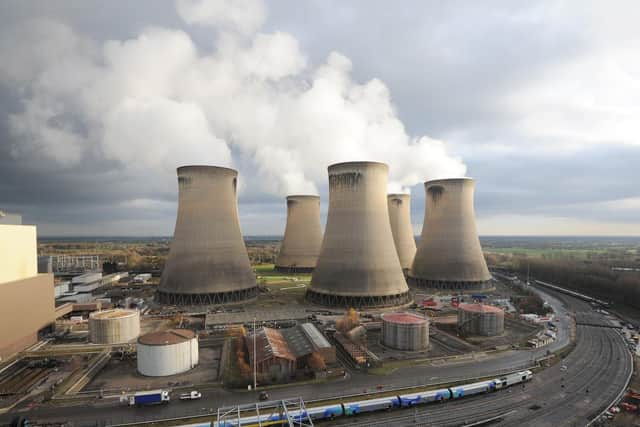Without radical action to decarbonise industries like steel and aviation UK will never reach net zero by 2050, says think-tank Onward
Think-tank Onward has set out a 25-point-plan to get the 12 most carbon-intensive industries - the so-called “carbon giants'' - to a position over the next thirty years where their net carbon emissions are zero.
Just 12 industries make up 62 per cent of all UK carbon emissions but decarbonising them will likely have a disruptive effect on the UK economy as they represent around 23 per cent of UK output and 21 per cent of current UK jobs.


Advertisement
Hide AdAdvertisement
Hide AdOnward says that if Ministers take the right steps, the new demand for renewables and low carbon technologies could deliver up to 1.7 million new green jobs, half of which are likely to be located in the North, Midlands and Scotland.
The research paper, Greening the Giants, for its cross-party Getting to Zero programme, says industries like manufacturing, steel and aviation will be politically harder to decarbonise because of the number of jobs they employ in so-called 'red wall' areas.
It says reducing the carbon emissions from these industries can be done using technology such as electrification, hydrogen, bioenergy and carbon capture and storage. And while every region stands to benefit from some new jobs, these jobs will be disproportionately located in areas like Yorkshire and the Humber that are set to lose out from the net zero transition.
Nearly four fifths of industrial emissions abatement at major sites through hydrogen could take place in the Midlands, North and Scotland, along with around three quarters from carbon capture and storage.
Advertisement
Hide AdAdvertisement
Hide AdAuthors Ted Christie-Miller and Alex Luke wrote: "This suggests that - contrary to some prevailing wisdom - there is no inevitable conflict between levelling up and net zero. With the right policies, the latter can drive the former and the transition can be, if not entirely painless, regionally progressive and economically productive."
Former Don Valley MP Caroline Flint, who is co-chair of the Getting to Zero commission: said: "If policymakers make the right calls these transformed industries can be located in the very same areas that right now are set to lose out.”
It comes as Business Secretary Kwasi Kwarteng promised that steel made in Sheffield “certainly won't be consigned to the history books”, amid calls for him to protect workers' jobs by nationalising a major firm.
According to the Onward report, the steel industry has reduced emissions by 58 per cent since 1990 and will need to cut emissions by 23 per cent from 2020 levels by 2030 in order to put the industry on track to net zero by 2050.
Advertisement
Hide AdAdvertisement
Hide AdJobs in steel are heavily concentrated in the North of England and Wales, with the industry representing one per cent of the workforce in Yorkshire and the Humber compared with 0.01 per cent in London.
Mr Christie-Miller wrote: “The UK has successfully halved its emissions since 1990, but that means the low-hanging fruit have already been picked. The next phase will require the wholesale transformation of industries that are integral to our economy and vital for regional jobs. It is essential the Government helps these industries to make the transition, while helping new net zero industries to flourish.
“We need to green the giants of industry through smart regulation and bold industrial strategy, using the energy around COP26 and the recovery from the pandemic to drive a net zero agenda over the next decade that is as ambitious as the pandemic response has been over the past year.”
Among the report's recommendations are to establish a Net Zero Delivery Taskforce, modelled on the successful Vaccines Taskforce, with a specific remit and ministerial backing to initiate major government sponsored trials of high risk, high reward technologies.
Advertisement
Hide AdAdvertisement
Hide AdIt also suggests publishing regional carbon budgets to hold local and mayoral authorities accountable for their progress on emissions, while devolving responsibility for electric vehicle charging networks and retrofitting housing stock to local government.
Comment Guidelines
National World encourages reader discussion on our stories. User feedback, insights and back-and-forth exchanges add a rich layer of context to reporting. Please review our Community Guidelines before commenting.